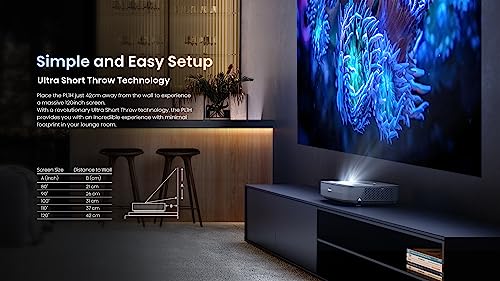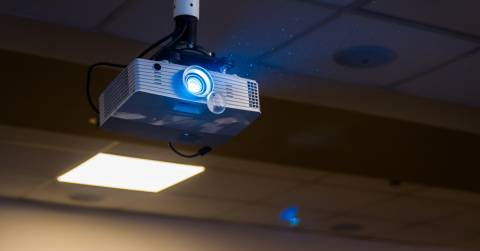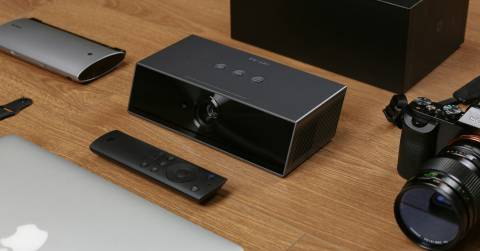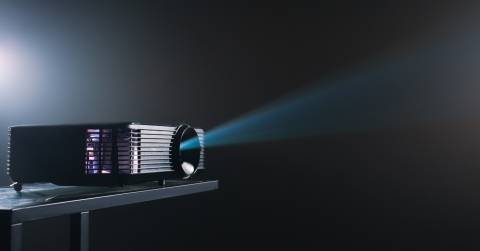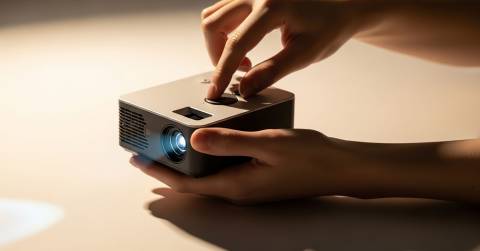The Best Hisense Short Throw Projector For 2025
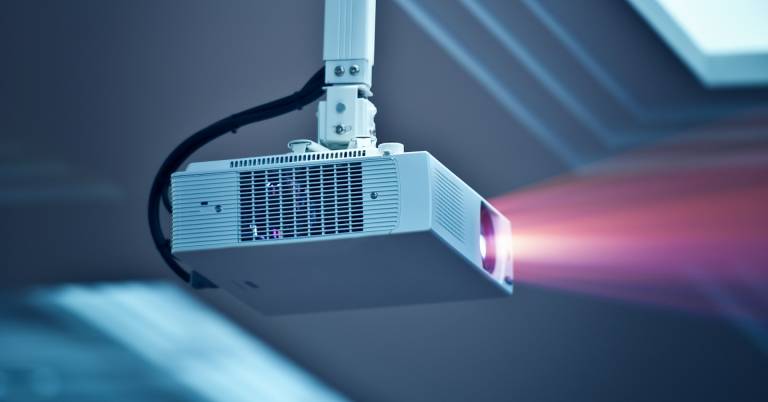
Summary
Hisense 100L9G Short Throw Projector
Hisense Laser PX3-PRO
Hisense PL1 Short Throw Projector
If you're building a home theater or upgrading your entertainment setup, a short-throw projector can be a game-changer, especially in rooms with limited space. Hisense has become a trusted name in this category, offering some of the best short-throw projectors on the market. Their laser-based models are especially popular, delivering stunning 4K resolution, vibrant color accuracy, and cinematic visuals even when placed just inches from the wall or screen. These projectors are ideal for immersive movie nights, sports viewing, or gaming without the need for ceiling mounts or long-distance setups.
That said, laser projectors aren't the only option worth considering. We've also included a few standout Hisense short-throw models that don’t use laser technology but still offer excellent performance, crisp images, and smart features like built-in streaming apps and voice control. In this guide, we’ll explore both laser and non-laser Hisense projectors to help you choose the right projector for your space and preferences.
Our Top Picks
Super bright (3000 lumens) 100-inch ALR screen included Built-in 40W Dolby Atmos speakers MEMC motion smoothing
Can be tricky to set up for first-time users
The 100L9G comes with TriChroma Laser Technology, which uses pure red, green, and blue lasers to cover an incredible 107% of the BT.2020 color space. The result? An ultra-vivid, intensely colorful picture that outshines most TVs and even many high-end projectors. Its 3000 lumens brightness ensures excellent performance even in well-lit rooms, while 4K HDR support makes highlights pop and dark scenes look truly cinematic.
Combined with the Ambient Light Rejecting (ALR) screen, this projector delivers superior clarity, contrast, and color fidelity in almost any lighting condition. What sets it apart further is the built-in 40W Dolby Atmos audio system, which provides a rich soundscape right out of the box—no external soundbar required. The MEMC motion smoothing ensures buttery-smooth action scenes and sports footage with virtually zero blur or lag.
This short-throw projector can sit just inches from your wall while projecting a 100-inch image, making it perfect for tight spaces where traditional long-throw projectors won’t work. However, some users may find the initial setup and calibration a bit complex, especially for first-time projector owners. But once you’ve got it dialed in, it’s a game-changer.
Ultra-high color accuracy (ΔE≈0.9) 4K resolution with AI upscaling Real-time AI image optimization Ultra short-throw design
The instruction manual are not very clear
The PX3-PRO is powered by Hisense's LPU (Laser Precision Unit) Technology, which achieves exceptional visual quality through a pure triple laser engine (RGB). It supports an ultra-wide color gamut (110% BT.2020)—even higher than many cinema-grade projectors—delivering stunning colors with ΔE≈0.9 color accuracy, which means you see the most true-to-life hues possible.
Thanks to AI-enhanced image processing, this projector adjusts brightness, reduces noise, and fine-tunes contrast in real-time, ensuring every scene is optimized whether you're watching movies, sports, or nature documentaries. The 4K resolution is further boosted by an AI upscaler, which enhances lower-resolution content and makes it look nearly native 4K. The image stays razor-sharp even at screen sizes up to 150 inches, making it perfect for large-scale viewing.
Its ultra short-throw (UST) design allows you to place the projector just inches from the wall to achieve massive screen sizes (80–150"), saving space and avoiding complicated ceiling mounts. One minor drawback is that the included documentation is not very clear, so users may need to spend some extra time or seek tutorials online during the initial setup.
Long-lasting X-Fusion laser light source (25,000+ hours) True 4K UHD resolution Digital Lens Focus Solid brightness
Color depth and vibrancy are slightly behind premium laser models
The PL1 is powered by X-Fusion laser technology, a system known for its longevity and clarity. This projector delivers over 25,000 hours of consistent performance, which is ideal for long-term use in homes where daily viewing is expected. Its 4K Ultra HD resolution provides crisp, highly detailed images across an 80- to 120-inch screen range—a perfect size for home theaters.
It supports HDR10, HLG, and Dolby Vision, offering deeper contrast and more realistic lighting for a true cinematic effect. Whether you’re watching moody dramas or bright animations, the PL1 enhances both ends of the spectrum. With Digital Lens Focus, users can easily get sharp visuals at different screen sizes without distortion. 2200 ANSI lumens of brightness ensure that content looks vibrant even in rooms with moderate ambient light.
Smart functionality is handled by Google TV, giving you a streamlined interface to access all your favorite streaming services. You’ll also get personalized recommendations based on your viewing history—great for discovering new content effortlessly. While the PL1 performs well in most aspects, it doesn’t quite reach the color vibrancy or contrast levels of Hisense’s higher-end TriChroma laser models like the PX3-PRO or 100L9G.
TriChroma RGB laser technology 107% BT.2020 color coverage Sharp 4K resolution 2200 lumens brightness
Requires a streaming device for full functionality
The PX1-PRO's TriChroma Laser Engine, developed by Hisense, uses lasers of pure red, green, and blue to create colors that are incredibly realistic and vivid. This results in a projector that achieves 107% of the BT.2020 color space, exceeding the performance of most TVs and projectors on the market.
With support for 4K UHD and HDR, the PX1-PRO ensures detailed images with enhanced depth and contrast. Whether you’re watching a moody film or a bright, colorful animation, this projector adapts effortlessly. The 2200 lumens brightness, when paired with an ALR (Ambient Light Rejecting) screen, provides clear visuals even in moderately lit environments.
Its ultra-short throw design allows it to project images up to 130 inches from a short distance, saving space and simplifying installation. Combined with MEMC (Motion Estimation, Motion Compensation) technology, the PX1-PRO delivers ultra-smooth motion, ideal for fast-paced content like sports and games. Unfortunately, it requires a streaming device for full functionality. However, if paired with an Android TV dongle or external device, the experience can still be fully connected.
Exceptional TriChroma laser engine Auto Magic AI for easy and fast setup Certified Dolby Vision and Atmos JBL-powered sound system
That performance can suffer in brightly lit rooms
One of the biggest selling points of the Hisense C1 is its 110% BT.2020 color space, enabled by its TriChroma laser engine. This allows it to deliver colors richer and more accurate than what’s possible on most TVs or standard projectors. The result is a visual experience that’s not only vibrant but incredibly true to life.
It supports screen sizes from 65 inches all the way to 300 inches, with Digital Lens Focus ensuring that no matter what size you project, the image remains crisp and clear. Setup is made easy with Auto Magic AI adjustment, which automates focus and keystone corrections—ideal for casual users and home theater fans alike.
The inclusion of Dolby Vision and Dolby Atmos, powered by JBL audio, puts the C1 firmly in premium territory. Audio and visual performance work hand-in-hand for a cinematic feel straight out of the box, no extra soundbar required. One minor downside is that performance can suffer in brightly lit rooms, but in typical indoor lighting or shaded environments, image quality remains vivid and immersive.
Ultra-accurate color rendering (ΔE ≈ 0.9) 4K resolution + AI upscaling Dolby Vision for enhanced HDR performance Gimbal-based design
The auto image adjustment sometimes feels a bit finicky
If you ever dreamed of turning your wall, ceiling, or backyard into a cinematic playground, the C2 from Hisense might just be your new favorite gadget. It’s compact but far from basic. Inside its unassuming frame lies a 28-laser-chip engine that produces a color range so wide it pushes past what your OLED TV can dream of. We're talking 110% BT.2020, which basically means colors are punchy, precise, and deeply immersive.
Forget just watching a movie, with Dolby Vision support, this thing pulls you into every frame. Paired with 4K resolution and AI upscaling, it can breathe new life into old content, sharpening and enhancing everything from low-res YouTube clips to Blu-ray classics. But here’s where the C2 gets interesting: the gimbal-mounted chassis. This clever design lets you pivot and tilt the projector like a studio light. Want to throw your movie on the ceiling while lying in bed? No problem. Want to shoot it diagonally across a room onto a side wall? Done.
That said, the auto image adjustment sometimes feels a bit finicky. It’s supposed to save you time, but if your screen isn’t perfectly flat or aligned, you’ll end up doing some manual fine-tuning. It is not a dealbreaker, but just something to keep in mind.
What to Look For in the best hisense short throw projector
Perhaps as a customer, you may be looking for a best hisense short throw projector that may provide you with just what you want, such as being environmentally friendly, freely selected, and so on.
In this section, we will discuss with you the buying guides and main factors to consider when planning to buy the product from e-commerce websites, so that when the time comes to make your final selection, everything would be laid out in front of you.
Brightness
The ambient lighting level, size and material of your projector screen will all affect the brightness. You should buy a professional seller if you are installing a projector in a permanent location, such as at your home, to ensure that you get the best image brightness and the correct screen material.
Projection Tech
DLP projectors with single-chip DLP chips could be subject to the so-called "rainbow effect." Sometimes, tiny, bright flashes with rainbow-like colors may appear, especially in dark scenes. Some DLP projectors have a minimal effect, while others can produce a distracting result, especially when there are bright areas against shady backgrounds. The rainbow effect is not a problem with LCD projectors, which are safer if someone in your household has sensitive eyes. There are many DLP projectors that produce excellent images.
Resolution
The calculation for projectors that have 4K ultra high definition (3,840 x 2,160 pixels) is slightly different.
Contrast Ratio
Contrast ratings can only be used to measure in dark rooms. They don't give any information about ambient lighting. Unusually dark blacks in the projector will result in lower contrast. A brighter projector will perform well in home theaters, but not in living rooms or offices.
Portability
Light Source
For longer periods of time, LEDs and lasers retain a greater percentage of their original brightness. While all light sources eventually lose their brightness, lamps lose the most in 500 hours. Then, they slowly decline over time. The brightness of LEDs and lasers will decrease more slowly over the course of their lifetimes.
Connection Methods
Component video, composite video and S-Video all make up the most common connections on large projectors. We're also seeing more projectors that offer direct USB connection to computers via a USB cable. A growing variety of projectors now have USB Type-C ports. The majority of USB-C ports can be used to transfer data or video using the DisplayPort protocol. Most USB-C ports support USB Power Delivery (USB PD), which means that a plugged in projector can supply 100 watts of power to charge a device or to charge it using a USB-C cable (assuming the device is capable of charging over USB-C).
FAQs
What is the advantage of a short throw projector over a regular projector?
Short-throw projectors can produce large images from a very short distance, making them ideal for small rooms or tight spaces. They reduce shadows, simplify installation, and often eliminate the need for ceiling mounts.
Are Hisense short throw projectors good for daytime viewing?
Yes, many Hisense models—especially their laser projectors—offer high brightness levels (often 2200 lumens or more), which allows for clear viewing even in moderately lit rooms. However, ambient light rejection screens are recommended for the best performance in bright spaces.
Can I stream directly from a Hisense short throw projector?
Most modern Hisense short throw projectors include built-in smart TV platforms like Android TV or VIDAA, allowing you to stream content directly from apps like Netflix, YouTube, and Disney+ without needing an external device.
Conclusion
In summary, the best hisense short throw projector is the one that will provide you with exactly what you want. Provided that you are not satisfied with the models listed above, we propose Hisense Laser Mini Projector C2 for you.
If you are unclear about how to select an item for yourself or someone else at any time in this post, please let us know! Our team of professionals is always pleased to help you find the best match.







